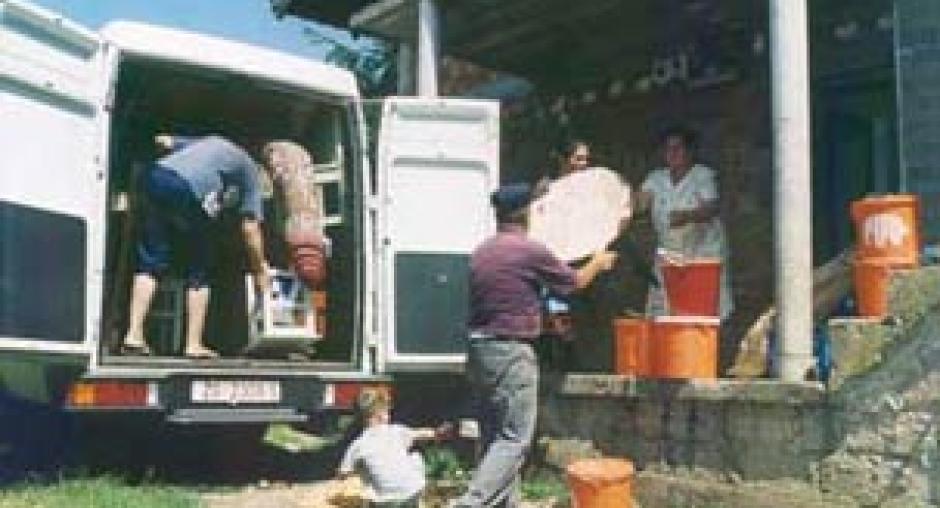Newsroom
OSCE conference calls for greater co-operation to help IDPs
VIENNA 5 November 2004

(OSCE)A displaced Croat family returns home in the village of Vrbanci, Republika Srpska, Bosnia and Herzegovina, in 2001. (OSCE) Photo details
VIENNA, 5 November 2004 - An OSCE conference on internally displaced persons (IDPs), held in Vienna on 4 and 5 November, called for pre-emptive action to avoid displacement and for better co-operation between states, international organizations and NGOs to find durable solutions to the plight of IDPs in the OSCE region.
"Internal displacement remains one of the most pressing human rights, humanitarian and political problems facing the OSCE region," said Walter Kälin, the new Representative of the UN Secretary General on the Human Rights of Internally Displaced Persons. "Approximately 3 million persons remain internally displaced in this region as a result of armed conflict and systematic violations of human rights."
Dennis McNamara, Special Adviser to the UN Emergency Relief Co-ordinator and Director of the Inter-Agency Internal Displacement Division, said: "By not addressing obvious causes earlier, we all pay much more both in financial and human terms in responding only when the humanitarian imperative becomes irresistible. The UN and regional organizations could play a much more valuable, pre-emptive role by taking time to ensure that the real causative factors are actively addressed as an integral part of the international response."
Two new reports on internal displacement in the OSCE region were released.
In a report titled Trapped in Displacement: Internally Displaced People in the OSCE Area, the Norwegian Refugee Council's Global IDP Project makes recommendations for improving state responses to internal displacement.
It calls on national authorities to ensure that IDPs can return freely in conditions of physical, material and legal safety to their home areas; that IDPs should be involved in the planning of durable solutions of their choice and that independent monitors should be granted access to IDPs and returnees.
A report by the Brookings Institution and Johns Hopkins SAIS Project on Internal Displacement, The Voting Rights of Internally Displaced Persons: The OSCE Region, calls on states to remove legal, political, and practical obstacles that prevent large numbers of IDPs in the OSCE region from voting.
"Internal displacement remains one of the most pressing human rights, humanitarian and political problems facing the OSCE region," said Walter Kälin, the new Representative of the UN Secretary General on the Human Rights of Internally Displaced Persons. "Approximately 3 million persons remain internally displaced in this region as a result of armed conflict and systematic violations of human rights."
Dennis McNamara, Special Adviser to the UN Emergency Relief Co-ordinator and Director of the Inter-Agency Internal Displacement Division, said: "By not addressing obvious causes earlier, we all pay much more both in financial and human terms in responding only when the humanitarian imperative becomes irresistible. The UN and regional organizations could play a much more valuable, pre-emptive role by taking time to ensure that the real causative factors are actively addressed as an integral part of the international response."
Two new reports on internal displacement in the OSCE region were released.
In a report titled Trapped in Displacement: Internally Displaced People in the OSCE Area, the Norwegian Refugee Council's Global IDP Project makes recommendations for improving state responses to internal displacement.
It calls on national authorities to ensure that IDPs can return freely in conditions of physical, material and legal safety to their home areas; that IDPs should be involved in the planning of durable solutions of their choice and that independent monitors should be granted access to IDPs and returnees.
A report by the Brookings Institution and Johns Hopkins SAIS Project on Internal Displacement, The Voting Rights of Internally Displaced Persons: The OSCE Region, calls on states to remove legal, political, and practical obstacles that prevent large numbers of IDPs in the OSCE region from voting.
